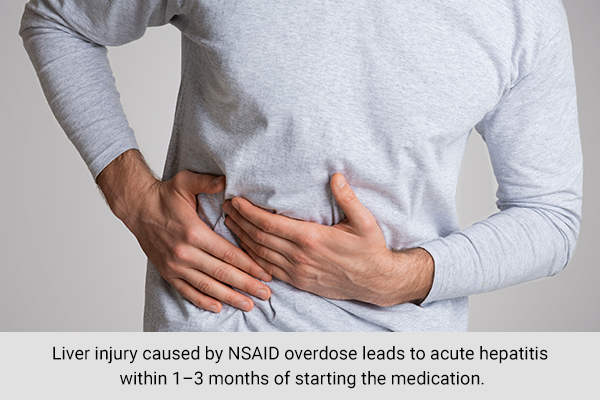In this article:
Some medicines are an indispensable part of every first-aid kit. These include painkillers such as acetaminophen (paracetamol) as well as nonsteroidal anti-inflammatory drugs (NSAIDs) (1) such as aspirin, ibuprofen, and naproxen.

Since they are easily available without a prescription, people often end up using them too much or too frequently, which may lead to negative side effects. This is why it is important to follow the dosage and instructions given on the label of over-the-counter (OTC) medicines.
The efficacy of the medication can vary depending on the type and severity of pain as well as other factors such as dosage. (2)
Harmful Effects of OTC Painkillers
Overuse of OTC pain medication can damage your health in the following ways.
1. Kidney problem
Long-term or excessive use of certain painkillers and nonsteroidal anti-inflammatory drugs such as ibuprofen, aspirin, acetaminophen, and naproxen sodium can increase the toxic load on your kidneys. (3)
The small blood vessels inside the kidneys have to work extra hard to filter out the waste from these medications. This can damage the blood vessels over time, resulting in analgesic nephropathy, a chronic kidney problem.
The risk of drug-induced kidney injury is further increased if you take these medicines while being dehydrated or having low blood pressure. (4)
2. Liver damage

Aspirin and acetaminophen (paracetamol) are widely used nonsteroidal anti-inflammatory drugs that are easily available over the counter. Taking them in high doses can be toxic for the liver, but the resulting damage may not be clinically apparent.
In most cases, liver injury caused by NSAID overdose leads to acute hepatitis within 1–3 months of starting the medication. (5) If you continue taking too much of this med for a long time, it can severely damage your liver and can even be fatal. (6)
Acetaminophen is the leading cause of drug-induced liver injury in the United States, but taking it in its recommended dosages can save you from this risk.
According to the United States Food and Drug Administration, a healthy adult should not take more than 4,000 mg of acetaminophen a day, while those with preexisting liver disease are recommended to keep the dose to 2,000 mg or less a day. (7)
3. Stomach issues
Common nonsteroidal anti-inflammatory drugs and painkillers such as diclofenac, naproxen, aspirin, and ibuprofen contain acetylsalicylic acid. Thus, these meds tend to increase gastric acidity, which, in turn, irritates and damages the inner lining of the stomach and duodenum.
NSAIDs also disrupt the healthy gut microbiome and bowel movements. Extensive or excessive use of these drugs may even cause ulcer formation in the stomach and small intestine. (8)
The best way to minimize these adverse effects is to take an antacid along with such medication. This proactive measure will help neutralize the acidity triggered by NSAIDs, analgesics, and antibiotics.
4. Heart failure

Taking NSAIDs for a prolonged period or in high doses can increase your cardiovascular risk, which may lead to a heart attack, stroke, heart failure, and even death. (9)(10) There is plenty of research to corroborate this claim, including a 2011 study published in BMJ and a 2013 review published in The Lancet.
In 2004, a very popular nonsteroidal anti-inflammatory drug called Vioxx (rofecoxib) was discontinued from the market due to this concern. (11)
Who Can Take Nonsteroidal Anti-Inflammatory Drugs (NSAIDs)?
NSAIDs are easily available without a prescription because they are generally considered safe for everyone. But overusing these meds can cause toxicity and lead to adverse health outcomes.
Certain factors can make you increasingly vulnerable to NSAID side effects. These factors include:
- If you are below 16 years or above 65 years of age
- If you are pregnant or trying to conceive
- If you are breastfeeding
- If you are on other medications
- If you have asthma
- If you have previously suffered an allergic reaction to NSAIDs
- If you have a history of stomach ulcers
- If you have any kind of preexisting heart, liver, or kidney ailment
- If you suffer from preexisting blood pressure, blood circulation, or bowel problems
If you have any of these risk factors, you must consult your doctor before starting any medication. The doctor may not prohibit the use of NSAIDs in such cases but will consider all the relevant factors, rule out risks, and recommend the appropriate dosage for your particular case.
If the doctor deems nonsteroidal anti-inflammatory drugs to be unsuitable for you after the evaluation, he may recommend a better alternative such as paracetamol. (12)
Final Word
OTC painkillers are largely considered safe and effective for healthy adults, but only when used occasionally and as directed. (1)
If you have to take them frequently, are on other medications, or have preexisting medical conditions, it’s best to consult your doctor to reduce the risk of side effects. (13)(14)
- Was this article helpful?
- YES, THANKS!NOT REALLY


